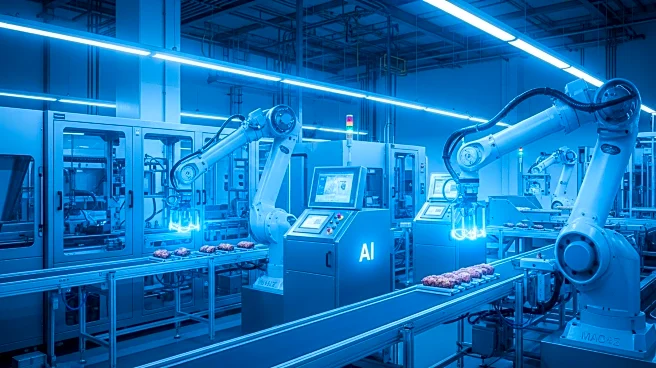What is the story about?
What's Happening?
The food and beverage manufacturing industry is facing significant challenges due to the rapid adoption of artificial intelligence (AI) technologies and evolving regulatory requirements. A recent report highlights that while 95% of manufacturers have implemented AI, 71% of their workforce is not adequately prepared to utilize these technologies effectively. This gap poses a strategic risk, potentially affecting the return on investment and competitive positioning of these companies. Additionally, the industry is experiencing regulatory tightening, with the FDA proposing stricter oversight on Generally Recognized as Safe (GRAS) ingredients, requiring mandatory notifications for most food substances. This move aligns with broader health and safety priorities. Furthermore, the sector is adapting to state-level restrictions, particularly in the alternative protein market, through innovative licensing models and technology partnerships.
Why It's Important?
The disconnect between AI deployment and workforce readiness in the food manufacturing sector underscores a critical need for investment in training and change management. Companies that successfully align their technological investments with human capabilities are likely to gain a competitive edge, while those that do not may fall behind. The regulatory changes, particularly the FDA's proposed GRAS oversight, increase compliance demands, potentially impacting product development timelines and costs. For alternative protein manufacturers, adapting to a patchwork of state regulations is crucial for scalability and market growth. These developments highlight the importance of strategic planning and innovation in navigating the evolving landscape of food manufacturing.
What's Next?
Manufacturers are expected to enhance their workforce training programs to bridge the AI readiness gap, potentially forming AI steering committees to integrate these technologies effectively. The FDA's proposed regulations will likely lead to increased scrutiny of food ingredients, prompting companies to reassess their compliance strategies. In the alternative protein sector, businesses may continue to explore creative partnerships and licensing agreements to overcome regulatory hurdles and expand their market presence. Stakeholders will need to monitor these regulatory shifts closely to adapt their operations and maintain competitiveness.
Beyond the Headlines
The emphasis on ESG (Environmental, Social, and Governance) transparency is becoming a strategic asset for food manufacturers, driven by regulatory requirements and consumer demand for sustainability. Companies are increasingly leveraging traceability data to verify ethical sourcing and reduce waste, which could lead to long-term shifts in supply chain management practices. As regulatory bodies crack down on greenwashing, businesses that fail to provide verifiable sustainability claims may face reputational risks.















